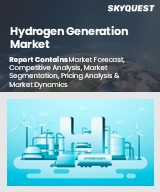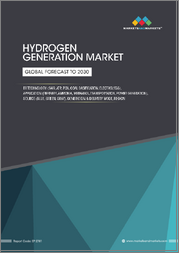
|
시장보고서
상품코드
1751246
수소 생성 시장 규모, 점유율, 동향 분석 리포트 : 시스템별, 기술별, 용도별, 지역별, 부문 예측(2025-2030년)Hydrogen Generation Market Size, Share & Trends Analysis Report By System (Merchant, Captive), By Technology (Steam Methane Reforming, Coal Gasification), By Application, By Region, And Segment Forecasts, 2025 - 2030 |
||||||
수소 생성 시장의 성장과 동향 :
Grand View Research, Inc.의 최신 리포트에 따르면 세계의 수소 생성 시장 규모는 2025-2030년에 CAGR 9.2%를 기록하며, 2030년에는 3,173억 9,000만 달러에 달할 것으로 예측됩니다.
세계 수소 생산 시장은 석유 제품 탈황에 대한 정부 규제 강화와 함께 청정 연료에 대한 수요 증가로 인해 주도될 가능성이 높습니다.
수소는 효과적인 에너지 운반체이며, 이러한 특성이 새로운 시장으로의 추가 침투에 크게 기여할 것으로 예측됩니다. 전 세계 전력 수요는 예측 기간 중 현재의 3분의 2까지 증가할 것으로 예측됩니다. 분산형 전원 및 유틸리티 관련 프로젝트에 집중함으로써 예측 기간 중 수소 생산 시장의 성장을 가속할 것으로 예측됩니다.
2021년에는 메탄 개질 부문이 시장을 주도할 것입니다. 이는 2021년 지배적인 부문이며 예측 기간 중 그 지위를 유지할 것으로 예측됩니다. 수증기 메탄 개질은 일산화탄소 및 이산화탄소를 포함한 다른 가스와 함께 수소를 생산하는 방법입니다. 수증기 메탄 개질 공정은 수소 생산에 있으며, 성숙된 첨단 기술입니다. 수증기 메탄 개질은 수소 생산을 위한 가장 경제적인 방법이기 때문에 전 세계에서 수소 생산에 대한 수요가 증가하고 있는 것은 수증기 메탄 개질 기술의 중요한 촉진제입니다.
용도별로는 암모니아 제조 부문이 2021년 시장을 주도했습니다. 암모니아 부문은 예측 기간 중 선두를 유지할 것으로 예측됩니다. 향후 수소 생산 시장은 수소의 적용 사례가 증가함에 따라 모든 부문에서 꾸준한 성장이 예상됩니다.
소스에서는 천연가스 부문이 2021년 시장을 주도할 것으로 예측됩니다. 수소는 수소, 일산화탄소, 이산화탄소를 생성하는 천연가스의 개질을 통해 만들어집니다. 천연가스로부터의 수소 생산은 가장 저렴한 수소 생산 방법입니다. 천연가스로부터의 수소 생산은 예측 기간 중 선두를 유지할 것으로 예측됩니다.
시스템을 기반으로 2021년에는 상업용 발전 부문이 시장을 주도할 것으로 예측됩니다. 상인에 의한 수소 생산은 수소가 중앙 제조 시설에서 생산되는 것을 의미합니다. 수소는 벌크탱크, 파이프라인, 실린더 트럭으로 운송되어 소비자에게 판매됩니다. 미국, 캐나다, 러시아 등 많은 국가에는 수소 운송 및 유통에 활용할 수 있는 기존 천연가스 파이프라인 네트워크가 광범위하게 존재합니다. 상업용 발전 부문은 예측 기간 중 선두를 유지할 것으로 예측됩니다.
스마트한 "에너지 절약형" 주택 및 상업용 건물에 대한 투자 증가는 에너지 생산에 수소를 채택하는 원동력이 될 것으로 예측됩니다. 수소는 연방정부 및 환경 규제를 준수하고, 증가하는 에너지 수요에 대응할 수 있으므로 투자자들에게 재정적으로 실행 가능한 대안이 될 수 있습니다. 청정 에너지로의 전환 추세와 정부의 우호적인 규제 등 여러 요인들이 수소 발전 시장 개발에 기여하고 있습니다.
수소 생산 시장 보고서 하이라이트
- 기술별로 세계 시장은 수증기 메탄 개질, 석탄 가스화, 기타로 세분화됩니다.
- 시스템별로는 2024년 캡티브 발전 부문이 약 64.47%로 가장 큰 비중을 차지했습니다.
- 암모니아 제조 부문은 2024년 23.56% 이상의 가장 큰 매출 점유율로 시장을 주도했습니다.
- 아시아태평양의 수소 생성 산업은 2024년에 세계를 석권하며, 35.34%를 넘는 최대 매출 점유율을 차지했습니다.
목차
제1장 조사 방법과 범위
제2장 개요
제3장 시장의 변수, 동향, 범위
- 세계의 수소 생성 시장 전망
- 밸류체인 분석
- 테크놀러지의 개요
- 규제 프레임워크
- 시장 역학
- 시장 성장 촉진요인 분석
- 시장 성장 억제요인 분석
- 업계 동향
- Porter's Five Forces 분석
- 공급 기업의 교섭력
- 바이어의 교섭력
- 대체의 위협
- 신규 진출업체의 위협
- 경쟁 기업 간 경쟁 관계
- PESTLE 분석
- 정치적
- 경제
- 사회 상황
- 테크놀러지
- 환경
- 법률상
제4장 수소 생성 시장 : 용도별 추정·동향 분석
- 수소 생성 시장 : 용도별 변동 분석, 2024년 및 2030년
- 메탄올 생산
- 암모니아 생산
- 정유소
- 교통기관
- 발전
- 산업용 난방
- 기타
제5장 수소 생성 시장 : 시스템별 추정·동향 분석
- 수소 생성 시장 : 시스템별 변동 분석, 2024년 및 2030년
- 머천트(운송)
- 캡티브(온사이트 소비)
제6장 수소 생성 시장 : 기술별 추정·동향 분석
- 수소 생성 시장 : 기술별 변동 분석, 2024년 및 2030년
- 석탄 가스화
- 수증기 메탄 개질
- 기타
제7장 수소 생성 시장 : 지역별 추정·동향 분석
- 지역별 분석, 2024년과 2030년
- 북미
- 용도별, 2018-2030년
- 시스템별, 2018-2030년
- 기술별, 2018-2030년
- 미국
- 캐나다
- 멕시코
- 유럽
- 용도별, 2018-2030년
- 시스템별, 2018-2030년
- 기술별, 2018-2030년
- 독일
- 영국
- 스페인
- 프랑스
- 이탈리아
- 러시아
- 덴마크
- 네덜란드
- 스웨덴
- 아시아태평양
- 용도별, 2018-2030년
- 시스템별, 2018-2030년
- 기술별, 2018-2030년
- 중국
- 인도
- 일본
- 한국
- 라틴아메리카
- 용도별, 2018-2030년
- 시스템별, 2018-2030년
- 기술별, 2018-2030년
- 브라질
- 아르헨티나
- 중동 및 아프리카
- 용도별, 2018-2030년
- 시스템별, 2018-2030년
- 기술별, 2018-2030년
- 사우디아라비아
- 아랍에미리트
- 남아프리카공화국
제8장 경쟁 구도
- 주요 시장 참여 기업에 의한 최근 동향과 영향 분석
- Kraljic Matrix
- 기업 분류
- 히트맵 분석
- 벤더 구도
- 원재료 공급업체 리스트
- 판매 대리점 리스트
- 기타 주요 제조업체 리스트
- List of Prospective End-Users
- 전략 지도제작
- 기업 개요/상장기업
- Linde Plc
- Messer
- Air Products and Chemicals, Inc
- Air Liquide International SA
- INOX Air Products Ltd
- Matheson Tri-Gas, Inc.
- SOL Group
- Iwatani Corporation
- Hydrogenics Corporation
- Tokyo Gas Chemicals Co., Ltd.
- Taiyo Nippon Sanso Corporation
- Teledyne Technologies Incorporated
- Hygear
- Claind
- Advanced Specialty Gases Inc.
Hydrogen Generation Market Growth & Trends:
The global hydrogen generation market size is expected to reach USD 317.39 billion by 2030, registering a CAGR of 9.2% from 2025 to 2030, according to a new report by Grand View Research, Inc. The global hydrogen generation market is likely to be driven by the growing demand for cleaner fuel, coupled with increasing governmental regulations for the desulphurization of petroleum products.
Hydrogen is an effective energy carrier, and this quality is expected to contribute, significantly, to its further penetration into newer markets. The global electricity demand is anticipated to witness an increase by nearly two-thirds of the current demand in the forecast period. Focus on the projects, related to distributed power & utility, expected to bolster the demand for hydrogen generation market growth during the forecast period.
The Methane Reforming segment led the market in 2021. This was the dominant segment in 2021 and is expected to keep its position during the forecast period. Steam Methane reforming is a method for producing hydrogen, along with other gases including carbon monoxide and carbon dioxide. The steam methane reforming process is a mature and advanced technology in hydrogen generation. The growing demand for hydrogen generation across the globe is a crucial driving factor for steam methane reformers technology, as steam methane reforming is the most economical method for hydrogen generation.
In Application, the ammonia production segment led the market in 2021. The ammonia segment will keep its lead during the forecast period. The future growth of the hydrogen generation market is expected to have steady growth in all the segments as application cases for hydrogen increase.
In source, the natural gas segment led the market in 2021. Hydrogen is created from natural gas reforming which produces hydrogen, carbon monoxide, and carbon dioxide. Hydrogen production from natural gas is the cheapest method of producing hydrogen. Hydrogen production from natural gas is expected to keep its lead during the forecast period.
Based on systems, the merchant generation segment led the market in 2021. Merchant generation of hydrogen means hydrogen is produced at a central production facility. It is transported and sold to the consumer by bulk tank, pipeline, or cylinder truck. In many countries such as the U.S., Canada, and Russia there is an extensive existing natural gas pipeline network that could be used to transport and distribute hydrogen. The merchant generation segment is expected to keep its lead during the forecast period.
Growing investments in smart "energy-saving" residential and commercial buildings are expected to provide an impetus toward the adoption of hydrogen for energy generation. Hydrogen is a financially viable option to investors as they also comply with federal and environmental regulations, catering to the ever-increasing demand for energy. Factors including shifting trend toward cleaner energy and favorable government regulations are contributing to the development of the hydrogen generation market.
Hydrogen Generation Market Report Highlights:
- Based on technology, the global market has been further divided into steam methane reforming, coal gasification, and others.
- Based on systems, the captive generation segment accounted for a notable revenue share of about 64.47% in 2024.
- The ammonia production segment led the market with the largest revenue share of above 23.56% in 2024.
- Asia Pacific hydrogen generation industry dominated globally in 2024 and accounted for the largest revenue share of over 35.34%.
Table of Contents
Chapter 1. Methodology and Scope
- 1.1. Market Segmentation & Scope
- 1.2. Market Definition
- 1.3. Information Procurement
- 1.3.1. Information Analysis
- 1.3.2. Market Formulation & Data Visualization
- 1.3.3. Data Validation & Publishing
- 1.4. Research Scope and Assumptions
- 1.4.1. List of Data Sources
Chapter 2. Executive Summary
- 2.1. Market Snapshot
- 2.2. Segmental Outlook
- 2.3. Competitive Outlook
Chapter 3. Market Variables, Trends, and Scope
- 3.1. Global Hydrogen Generation Market Outlook
- 3.2. Value Chain Analysis
- 3.3. Technology Overview
- 3.4. Regulatory Framework
- 3.5. Market Dynamics
- 3.5.1. Market Driver Analysis
- 3.5.2. Market Restraint Analysis
- 3.5.3. Industry Trends
- 3.5.3.1. Economic Trends
- 3.5.3.2. Trade Scenario
- 3.6. Porter's Five Forces Analysis
- 3.6.1. Bargaining Power of Suppliers
- 3.6.2. Bargaining Power of Buyers
- 3.6.3. Threat of Substitution
- 3.6.4. Threat of New Entrants
- 3.6.5. Competitive Rivalry
- 3.7. PESTLE Analysis
- 3.7.1. Political
- 3.7.2. Economic
- 3.7.3. Social Landscape
- 3.7.4. Technology
- 3.7.5. Environmental
- 3.7.6. Legal
Chapter 4. Hydrogen Generation Market: Application Estimates & Trend Analysis
- 4.1. Hydrogen Generation Market: Application Movement Analysis, 2024 & 2030
- 4.2. Methanol Production
- 4.2.1. Market estimates and forecasts, 2018 - 2030 (USD Billion) (Million Metric Tons)
- 4.3. Ammonia Production
- 4.3.1. Market estimates and forecasts, 2018 - 2030 (USD Billion) (Million Metric Tons)
- 4.4. Petroleum Refinery
- 4.4.1. Market estimates and forecasts, 2018 - 2030 (USD Billion) (Million Metric Tons)
- 4.5. Transportation
- 4.5.1. Market estimates and forecasts, 2018 - 2030 (USD Billion) (Million Metric Tons)
- 4.6. Power Generation
- 4.6.1. Market estimates and forecasts, 2018 - 2030 (USD Billion) (Million Metric Tons)
- 4.7. Industrial Heating
- 4.7.1. Market estimates and forecasts, 2018 - 2030 (USD Billion) (Million Metric Tons)
- 4.8. Others
- 4.8.1. Market estimates and forecasts, 2018 - 2030 (USD Billion) (Million Metric Tons)
Chapter 5. Hydrogen Generation Market: Systems Estimates & Trend Analysis
- 5.1. Hydrogen Generation Market: Systems Movement Analysis, 2024 & 2030
- 5.2. Merchant (Transportation)
- 5.2.1. Market estimates and forecasts, 2018 - 2030 (USD Billion) (Million Metric Tons)
- 5.3. Captive (On-Site Consumption)
- 5.3.1. Market estimates and forecasts, 2018 - 2030 (USD Billion) (Million Metric Tons)
Chapter 6. Hydrogen Generation Market: Technology Estimates & Trend Analysis
- 6.1. Hydrogen Generation Market: Technology Movement Analysis, 2024 & 2030
- 6.2. Coal Gasification
- 6.2.1. Market estimates and forecasts, 2018 - 2030 (USD Billion) (Million Metric Tons)
- 6.3. Steam Methane Reforming
- 6.3.1. Market estimates and forecasts, 2018 - 2030 (USD Billion) (Million Metric Tons)
- 6.4. Others
- 6.4.1. Market estimates and forecasts, 2018 - 2030 (USD Billion) (Million Metric Tons)
Chapter 7. Hydrogen Generation Market: Regional Estimates & Trend Analysis
- 7.1. Regional Analysis, 2024 & 2030
- 7.2. North America
- 7.2.1. Market estimates and forecasts, 2018 - 2030 (USD Billion) (Million Metric Tons)
- 7.2.2. Market estimates and forecasts, by Application, 2018 - 2030 (USD Billion) (Million Metric Tons)
- 7.2.3. Market estimates and forecasts, by systems, 2018 - 2030 (USD Billion) (Million Metric Tons)
- 7.2.4. Market estimates and forecasts, by Technology, 2018 - 2030 (USD Billion) (Million Metric Tons)
- 7.2.5. U.S.
- 7.2.5.1. Market estimates and forecasts, 2018 - 2030 (USD Billion) (Million Metric Tons)
- 7.2.5.2. Market estimates and forecasts, by Application, 2018 - 2030 (USD Billion) (Million Metric Tons)
- 7.2.5.3. Market estimates and forecasts, by systems, 2018 - 2030 (USD Billion) (Million Metric Tons)
- 7.2.5.4. Market estimates and forecasts, by Technology, 2018 - 2030 (USD Billion) (Million Metric Tons)
- 7.2.6. Canada
- 7.2.6.1. Market estimates and forecasts, 2018 - 2030 (USD Billion) (Million Metric Tons)
- 7.2.6.2. Market estimates and forecasts, by Application, 2018 - 2030 (USD Billion) (Million Metric Tons)
- 7.2.6.3. Market estimates and forecasts, by systems, 2018 - 2030 (USD Billion) (Million Metric Tons)
- 7.2.6.4. Market estimates and forecasts, by Technology, 2018 - 2030 (USD Billion) (Million Metric Tons)
- 7.2.7. Mexico
- 7.2.7.1. Market estimates and forecasts, 2018 - 2030 (USD Billion) (Million Metric Tons)
- 7.2.7.2. Market estimates and forecasts, by Application, 2018 - 2030 (USD Billion) (Million Metric Tons)
- 7.2.7.3. Market estimates and forecasts, by systems, 2018 - 2030 (USD Billion) (Million Metric Tons)
- 7.2.7.4. Market estimates and forecasts, by Technology, 2018 - 2030 (USD Billion) (Million Metric Tons)
- 7.3. Europe
- 7.3.1. Market estimates and forecasts, 2018 - 2030 (USD Billion) (Million Metric Tons)
- 7.3.2. Market estimates and forecasts, by Application, 2018 - 2030 (USD Billion) (Million Metric Tons)
- 7.3.3. Market estimates and forecasts, by systems, 2018 - 2030 (USD Billion) (Million Metric Tons)
- 7.3.4. Market estimates and forecasts, by Technology, 2018 - 2030 (USD Billion) (Million Metric Tons)
- 7.3.5. Germany
- 7.3.5.1. Market estimates and forecasts, 2018 - 2030 (USD Billion) (Million Metric Tons)
- 7.3.5.2. Market estimates and forecasts, by Application, 2018 - 2030 (USD Billion) (Million Metric Tons)
- 7.3.5.3. Market estimates and forecasts, by systems, 2018 - 2030 (USD Billion) (Million Metric Tons)
- 7.3.5.4. Market estimates and forecasts, by Technology, 2018 - 2030 (USD Billion) (Million Metric Tons)
- 7.3.6. UK
- 7.3.6.1. Market estimates and forecasts, 2018 - 2030 (USD Billion) (Million Metric Tons)
- 7.3.6.2. Market estimates and forecasts, by Application, 2018 - 2030 (USD Billion) (Million Metric Tons)
- 7.3.6.3. Market estimates and forecasts, by systems, 2018 - 2030 (USD Billion) (Million Metric Tons)
- 7.3.6.4. Market estimates and forecasts, by Technology, 2018 - 2030 (USD Billion) (Million Metric Tons)
- 7.3.7. Spain
- 7.3.7.1. Market estimates and forecasts, 2018 - 2030 (USD Billion) (Million Metric Tons)
- 7.3.7.2. Market estimates and forecasts, by Application, 2018 - 2030 (USD Billion) (Million Metric Tons)
- 7.3.7.3. Market estimates and forecasts, by systems, 2018 - 2030 (USD Billion) (Million Metric Tons)
- 7.3.7.4. Market estimates and forecasts, by Technology, 2018 - 2030 (USD Billion) (Million Metric Tons)
- 7.3.8. France
- 7.3.8.1. Market estimates and forecasts, 2018 - 2030 (USD Billion) (Million Metric Tons)
- 7.3.8.2. Market estimates and forecasts, by Application, 2018 - 2030 (USD Billion) (Million Metric Tons)
- 7.3.8.3. Market estimates and forecasts, by systems, 2018 - 2030 (USD Billion) (Million Metric Tons)
- 7.3.8.4. Market estimates and forecasts, by Technology, 2018 - 2030 (USD Billion) (Million Metric Tons)
- 7.3.9. Italy
- 7.3.9.1. Market estimates and forecasts, 2018 - 2030 (USD Billion) (Million Metric Tons)
- 7.3.9.2. Market estimates and forecasts, by Application, 2018 - 2030 (USD Billion) (Million Metric Tons)
- 7.3.9.3. Market estimates and forecasts, by systems, 2018 - 2030 (USD Billion) (Million Metric Tons)
- 7.3.9.4. Market estimates and forecasts, by Technology, 2018 - 2030 (USD Billion) (Million Metric Tons)
- 7.3.10. Russia
- 7.3.10.1. Market estimates and forecasts, 2018 - 2030 (USD Billion) (Million Metric Tons)
- 7.3.10.2. Market estimates and forecasts, by Application, 2018 - 2030 (USD Billion) (Million Metric Tons)
- 7.3.10.3. Market estimates and forecasts, by systems, 2018 - 2030 (USD Billion) (Million Metric Tons)
- 7.3.10.4. Market estimates and forecasts, by Technology, 2018 - 2030 (USD Billion) (Million Metric Tons)
- 7.3.11. Denmark
- 7.3.11.1. Market estimates and forecasts, 2018 - 2030 (USD Billion) (Million Metric Tons)
- 7.3.11.2. Market estimates and forecasts, by Application, 2018 - 2030 (USD Billion) (Million Metric Tons)
- 7.3.11.3. Market estimates and forecasts, by systems, 2018 - 2030 (USD Billion) (Million Metric Tons)
- 7.3.11.4. Market estimates and forecasts, by Technology, 2018 - 2030 (USD Billion) (Million Metric Tons)
- 7.3.12. Netherlands
- 7.3.12.1. Market estimates and forecasts, 2018 - 2030 (USD Billion) (Million Metric Tons)
- 7.3.12.2. Market estimates and forecasts, by Application, 2018 - 2030 (USD Billion) (Million Metric Tons)
- 7.3.12.3. Market estimates and forecasts, by systems, 2018 - 2030 (USD Billion) (Million Metric Tons)
- 7.3.12.4. Market estimates and forecasts, by Technology, 2018 - 2030 (USD Billion) (Million Metric Tons)
- 7.3.13. Sweden
- 7.3.13.1. Market estimates and forecasts, 2018 - 2030 (USD Billion) (Million Metric Tons)
- 7.3.13.2. Market estimates and forecasts, by Application, 2018 - 2030 (USD Billion) (Million Metric Tons)
- 7.3.13.3. Market estimates and forecasts, by systems, 2018 - 2030 (USD Billion) (Million Metric Tons)
- 7.3.13.4. Market estimates and forecasts, by Technology, 2018 - 2030 (USD Billion) (Million Metric Tons)
- 7.4. Asia Pacific
- 7.4.1. Market estimates and forecasts, 2018 - 2030 (USD Billion) (Million Metric Tons)
- 7.4.2. Market estimates and forecasts, by Application, 2018 - 2030 (USD Billion) (Million Metric Tons)
- 7.4.3. Market estimates and forecasts, by systems, 2018 - 2030 (USD Billion) (Million Metric Tons)
- 7.4.4. Market estimates and forecasts, by Technology, 2018 - 2030 (USD Billion) (Million Metric Tons)
- 7.4.5. China
- 7.4.5.1. Market estimates and forecasts, 2018 - 2030 (USD Billion) (Million Metric Tons)
- 7.4.5.2. Market estimates and forecasts, by Application, 2018 - 2030 (USD Billion) (Million Metric Tons)
- 7.4.5.3. Market estimates and forecasts, by systems, 2018 - 2030 (USD Billion) (Million Metric Tons)
- 7.4.5.4. Market estimates and forecasts, by Technology, 2018 - 2030 (USD Billion) (Million Metric Tons)
- 7.4.6. India
- 7.4.6.1. Market estimates and forecasts, 2018 - 2030 (USD Billion) (Million Metric Tons)
- 7.4.6.2. Market estimates and forecasts, by Application, 2018 - 2030 (USD Billion) (Million Metric Tons)
- 7.4.6.3. Market estimates and forecasts, by systems, 2018 - 2030 (USD Billion) (Million Metric Tons)
- 7.4.6.4. Market estimates and forecasts, by Technology, 2018 - 2030 (USD Billion) (Million Metric Tons)
- 7.4.7. Japan
- 7.4.7.1. Market estimates and forecasts, 2018 - 2030 (USD Billion) (Million Metric Tons)
- 7.4.7.2. Market estimates and forecasts, by Application , 2018 - 2030 (USD Billion) (Million Metric Tons)
- 7.4.7.3. Market estimates and forecasts, by systems, 2018 - 2030 (USD Billion) (Million Metric Tons)
- 7.4.7.4. Market estimates and forecasts, by Technology, 2018 - 2030 (USD Billion) (Million Metric Tons)
- 7.4.8. South Korea
- 7.4.8.1. Market estimates and forecasts, 2018 - 2030 (USD Billion) (Million Metric Tons)
- 7.4.8.2. Market estimates and forecasts, by Application, 2018 - 2030 (USD Billion) (Million Metric Tons)
- 7.4.8.3. Market estimates and forecasts, by systems, 2018 - 2030 (USD Billion) (Million Metric Tons)
- 7.4.8.4. Market estimates and forecasts, by Technology, 2018 - 2030 (USD Billion) (Million Metric Tons)
- 7.5. Latin America
- 7.5.1. Market estimates and forecasts, 2018 - 2030 (USD Billion) (Million Metric Tons)
- 7.5.2. Market estimates and forecasts, by Application, 2018 - 2030 (USD Billion) (Million Metric Tons)
- 7.5.3. Market estimates and forecasts, by systems, 2018 - 2030 (USD Billion) (Million Metric Tons)
- 7.5.4. Market estimates and forecasts, by Technology, 2018 - 2030 (USD Billion) (Million Metric Tons)
- 7.5.5. Brazil
- 7.5.5.1. Market estimates and forecasts, 2018 - 2030 (USD Billion) (Million Metric Tons)
- 7.5.5.2. Market estimates and forecasts, by Application, 2018 - 2030 (USD Billion) (Million Metric Tons)
- 7.5.5.3. Market estimates and forecasts, by Technology, 2018 - 2030 (USD Billion) (Million Metric Tons)
- 7.5.6. Argentina
- 7.5.6.1. Market estimates and forecasts, 2018 - 2030 (USD Billion) (Million Metric Tons)
- 7.5.6.2. Market estimates and forecasts, by Application , 2018 - 2030 (USD Billion) (Million Metric Tons)
- 7.5.6.3. Market estimates and forecasts, by systems, 2018 - 2030 (USD Billion) (Million Metric Tons)
- 7.5.6.4. Market estimates and forecasts, by Technology, 2018 - 2030 (USD Billion) (Million Metric Tons)
- 7.6. Middle East & Africa
- 7.6.1. Market estimates and forecasts, 2018 - 2030 (USD Billion) (Million Metric Tons)
- 7.6.2. Market estimates and forecasts, by Application , 2018 - 2030 (USD Billion) (Million Metric Tons)
- 7.6.3. Market estimates and forecasts, by systems, 2018 - 2030 (USD Billion) (Million Metric Tons)
- 7.6.4. Market estimates and forecasts, by Technology, 2018 - 2030 (USD Billion) (Million Metric Tons)
- 7.6.5. Saudi Arabia
- 7.6.5.1. Market estimates and forecasts, 2018 - 2030 (USD Billion) (Million Metric Tons)
- 7.6.5.2. Market estimates and forecasts, by Application , 2018 - 2030 (USD Billion) (Million Metric Tons)
- 7.6.5.3. Market estimates and forecasts, by systems, 2018 - 2030 (USD Billion) (Million Metric Tons)
- 7.6.5.4. Market estimates and forecasts, by Technology, 2018 - 2030 (USD Billion) (Million Metric Tons)
- 7.6.6. UAE
- 7.6.6.1. Market estimates and forecasts, 2018 - 2030 (USD Billion) (Million Metric Tons)
- 7.6.6.2. Market estimates and forecasts, by Application , 2018 - 2030 (USD Billion) (Million Metric Tons)
- 7.6.6.3. Market estimates and forecasts, by systems, 2018 - 2030 (USD Billion) (Million Metric Tons)
- 7.6.6.4. Market estimates and forecasts, by Technology, 2018 - 2030 (USD Billion) (Million Metric Tons)
- 7.6.7. South Africa
- 7.6.7.1. Market estimates and forecasts, 2018 - 2030 (USD Billion) (Million Metric Tons)
- 7.6.7.2. Market estimates and forecasts, by Application , 2018 - 2030 (USD Billion) (Million Metric Tons)
- 7.6.7.3. Market estimates and forecasts, by systems, 2018 - 2030 (USD Billion) (Million Metric Tons)
- 7.6.7.4. Market estimates and forecasts, by Technology, 2018 - 2030 (USD Billion) (Million Metric Tons)
Chapter 8. Competitive Landscape
- 8.1. Recent Developments & Impact Analysis, By Key Market Participants
- 8.2. Kraljic Matrix
- 8.3. Company Categorization
- 8.4. Heat Map Analysis
- 8.5. Vendor Landscape
- 8.5.1. List of Raw Material Suppliers
- 8.5.2. List of Distributors
- 8.5.3. List of Other Prominent Manufacturers
- 8.6. List of Prospective End-Users
- 8.7. Strategy Mapping
- 8.8. Company Profiles/Listing
- 8.8.1. Linde Plc
- 8.8.1.1. Company Overview
- 8.8.1.2. Financial Performance
- 8.8.1.3. Product Benchmarking
- 8.8.2. Messer
- 8.8.2.1. Company Overview
- 8.8.2.2. Financial Performance
- 8.8.2.3. Product Benchmarking
- 8.8.3. Air Products and Chemicals, Inc
- 8.8.3.1. Company Overview
- 8.8.3.2. Financial Performance
- 8.8.3.3. Product Benchmarking
- 8.8.4. Air Liquide International S.A
- 8.8.4.1. Company Overview
- 8.8.4.2. Financial Performance
- 8.8.4.3. Product Benchmarking
- 8.8.5. INOX Air Products Ltd
- 8.8.5.1. Company Overview
- 8.8.5.2. Financial Performance
- 8.8.5.3. Product Benchmarking
- 8.8.6. Matheson Tri-Gas, Inc.
- 8.8.6.1. Company Overview
- 8.8.6.2. Financial Performance
- 8.8.6.3. Product Benchmarking
- 8.8.7. SOL Group
- 8.8.7.1. Company Overview
- 8.8.7.2. Financial Performance
- 8.8.7.3. Product Benchmarking
- 8.8.8. Iwatani Corporation
- 8.8.8.1. Company Overview
- 8.8.8.2. Financial Performance
- 8.8.8.3. Product Benchmarking
- 8.8.9. Hydrogenics Corporation
- 8.8.9.1. Company Overview
- 8.8.9.2. Financial Performance
- 8.8.9.3. Product Benchmarking
- 8.8.10. Tokyo Gas Chemicals Co., Ltd.
- 8.8.10.1. Company Overview
- 8.8.10.2. Financial Performance
- 8.8.10.3. Product Benchmarking
- 8.8.11. Taiyo Nippon Sanso Corporation
- 8.8.11.1. Company Overview
- 8.8.11.2. Financial Performance
- 8.8.11.3. Product Benchmarking
- 8.8.12. Teledyne Technologies Incorporated
- 8.8.12.1. Company Overview
- 8.8.12.2. Financial Performance
- 8.8.12.3. Product Benchmarking
- 8.8.13. Hygear
- 8.8.13.1. Company Overview
- 8.8.13.2. Financial Performance
- 8.8.13.3. Product Benchmarking
- 8.8.14. Claind
- 8.8.14.1. Company Overview
- 8.8.14.2. Financial Performance
- 8.8.14.3. Product Benchmarking
- 8.8.15. Advanced Specialty Gases Inc.
- 8.8.15.1. Company Overview
- 8.8.15.2. Financial Performance
- 8.8.15.3. Product Benchmarking
- 8.8.1. Linde Plc
(주말 및 공휴일 제외)


















